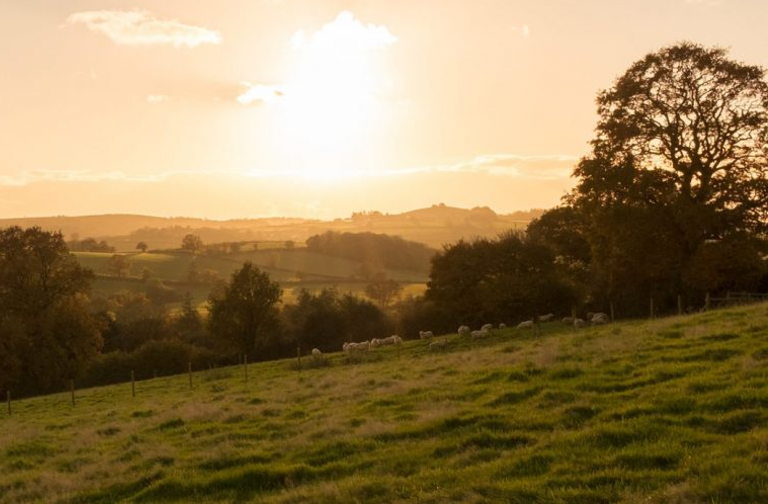Last summer the small abattoir in the centre of Frome, just a mile or so from my holding, closed its doors for good. As I understand it, the site is being redeveloped for housing and (yet another) local arts centre. There are no plans to create a new abattoir.
I imagine this will be one of the less mourned business closures locally. I’ve heard whispered tales passing from mouth to mouth about the horrors of the abattoir: the rivers of blood running down Vicarage Street at dead of night, the unearthly screams of doomed animals reverberating off the walls of St Johns church nearby – urban myths. Particularly under its last management regime, the service provided by the abattoir was never less than professional, but an air of disrepute hangs over the business of killing livestock. Plenty of people are happy to eat meat, but fewer like to be reminded about what eating meat involves. I welcomed the fact that the abattoir was in the town centre, so that people going about their daily business could at least see the trucks and trailers of live animals heading to their final destination and have some kind of connection to the business of life and death that is farming. Even so, most local residents I’ve talked to, didn’t know there was an abattoir in town.
I for one will mourn its loss. I can’t say I ever particularly enjoyed taking my animals there – not least because of the increasingly overbearing legislation and form-filling that has accumulated around the raising and slaughtering of livestock in recent years, mostly as a result of food scares associated with large-scale farming that nevertheless bit hardest on smallholders. But it was good to have a small local abattoir that was happy to process just one or two animals, and which was close enough by to keep the stress of moving the animals to a minimum. In the 1980s, there were more than a thousand abattoirs in Britain, a number that has now dwindled to less than 300 (and less than 100 in the case of small red meat abattoirs). Leaving aside issues about the role of livestock in sustainable farming (on which I’ve written copiously before), I’m not at all convinced that these closures are a good thing for either animal or human welfare. Our culture seems endlessly concerned with micro-managing small risks of the kind that lie behind small abattoir closures, while blithely ignoring much larger risks like climate change.
Yet if we’re to have the kind of small farm future that I think we need to create a just and sustainable society, then we’ll also need a local agricultural infrastructure to support it. The closure of Frome’s abattoir is one more little step in the wrong direction. Time was when the point of a small market town like Frome was mostly to provide those kind of services to the people living and working in its rural surroundings. It wasn’t so long ago that there was still a cattle market in the town centre. Year by year, the contact of the general public with farming is eroded.
A walk around Frome reveals a plethora of lovely old buildings with all manner of hatchways, trapdoors, gantries, workshops, stables and so forth, that show how work, including agricultural work, was once part of daily life in the town. Today these buildings are almost purely residential. Many of them now have listed status and are part of the town’s conservation area. Strange how we’re so concerned to preserve the form of old buildings, but so happy to dispose of their function. Those who speak up for a more localised mixed agriculture are widely dismissed as backward-looking romantics, whereas those who maintain the pretence of it by preserving old buildings, are hailed as forward-thinking conservationists standing up to the vandalism of development.
To me, the more telling vandalism is in the gutting of local economies, wrought by the huge industrial abattoirs, markets, feedlots and all the other paraphernalia of modern large-scale farming which has been removed from public view. In the past, towns and cities usually grew up around working functions, as commercial or industrial centres. But now these functions have become so large and concentrated that often they can no longer fit within the distended boundaries of our modern cities. The port at Shanghai, the largest in the world, at 3,600 sq km is more than twice the size of Greater London. And most of Britain’s old port cities, including London, are no longer working ports – a function that has been outsourced to non-urban places like Felixstowe with greater legroom. All this raises the question of what modern towns and cities are actually for. Perhaps, as Andy McGuire mischievously suggested on Small Farm Future some time ago, they’re the human equivalent of the feedlot operations that, in agriculture, have undermined so much of the more localised kinds of farming infrastructure memorialized in Frome’s built environment. Which invites a worrying comparison – might the resource-intensive urban life of the modern style prove as short and one directional as the lives of feedlot animals in the face of the numerous crises now upon us? In that light, anything we can do to build up local autonomy and resilience seems worth investing in – including small, town-centre abattoirs.
Photograph: Matt Gibson






